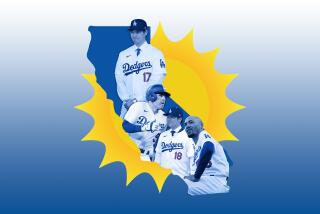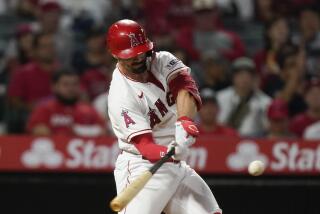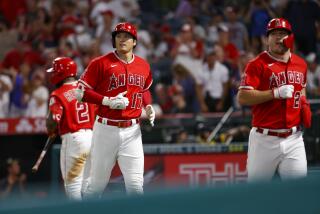Longshots Give Angels Long Shots : Pettis and Schofield Provide Some Unexpected Power
- Share via
It was that special kind of game: Tight, tense, likely to be decided by one big hit.
“Yes,” Gary Pettis agreed, “I thought a home run might make the difference, but I didn’t expect it from myself.”
Pettis was undoubtedly not alone in that assessment.
He had hit only 12 home runs in his three-plus seasons with the Angels before drilling a two-run homer off a favorite target Friday night.
Pettis connected against Dennis (Oil Can) Boyd in the seventh inning of the third game of the American League playoffs with the Boston Red Sox.
The Angels won, 5-3. The Pettis homer had made it 4-1 and proved decisive.
Or was it the Dick Schofield homer that came with two outs in the same inning and broke a 1-1 tie? Bob Boone then singled, and Pettis followed with his own home run.
Schofield has also played three-plus seasons with the Angels and hit 28 homers, including a career-high 13 during the 1986 regular season.
Schofield and Pettis? Not exactly Reggie and Rupe. Not exactly DeCinces and Downing.
“If somebody bet that we’d both hit homers in the same game,” Pettis said, “I’m sure they made a lot of money.”
Maybe Schofield was headed for the automatic teller; he was out of the clubhouse that fast.
He refused his club’s request to go to the media interview room after the game and had a clubhouse attendant bring his clothes into the shower room so that he could depart by a back door, leaving a herd of reporters and cameramen stranded at his locker.
A club official suggested that the painfully shy Schofield had found the media onslaught in the cramped clubhouse at Boston’s Fenway Park to be claustrophobic and didn’t want to experience it again.
Manager Gene Mauch, among others, believes he should get used to it.
He believes that his 23-year-old shortstop will be in the limelight for years to come, that 1986 (when Schofield played brilliantly in the field again and also had career highs for batting average, .249, and runs batted in, 57) was just a preview.
“It’s just a matter of time before he becomes the type player who hits 20 homers and steals 25 bases a year,” Mauch said. “I mean every year.”
Pettis also made important strides in 1986, batting a career-high .258 amid the continuing pressure of trying to cut down on his strikeouts and become the contact hitter Mauch envisions.
Along the way, there has been criticism from the media, suggestions that his stubbornness stands in the way of success, that he is too resistant to what the Angels are trying to make of him.
One such article is taped to the side of his locker.
Pettis glances at it, but he refuses to gloat.
Progress is his most important product.
“It bothers me some,” he said, alluding to some of the coverage, “but then I don’t think they’d be saying what they say if they were in my situation.
“Maybe it looks easy from where they sit, but it’s not. I’d like to let them try my position sometime. But I think that if you’re going to play any pro sport, you have to accept the good with the bad. I realize that now. I can handle it.”
And more, apparently.
Said Pettis, whose 139 hits were 25 more than he had in any other season: “The more hits you get, the more confidence you get. I’m more patient and selective now. I don’t swing at as many bad pitches.”
The home run? A screwball out and over the plate, Pettis said.
Boyd had thrown him a similar screwball in a May 6 game at Fenway Park, and Pettis had hit a two-run homer in a 6-2 victory. That had been his first home run in 114 games. He hit only four others during the regular season, one in the win over the Texas Rangers that clinched the Western Division title.
The May homer off Boyd was on Mauch’s mind when he batted Pettis in the leadoff spot Friday night.
“I wanted Gary up there as many times as possible,” Mauch said. “It isn’t so much that the hitter knows (what he has done against a pitcher in the past), it’s that the pitcher knows it, too.”
Was Pettis thinking the impossible, thinking home run?
“Not at all,” he said. “I had struck out the time before and I just wanted to keep the rally going. I wanted to get a good swing at a ball in the strike zone.
“I wouldn’t say it’s an accident when I hit a home run because I’m strong enough to hit them, but it’s not my kind of game. I’m just trying to get on by a hit, walk or error.”
This home run, however, will stay with him.
“I got to first base, saw (Dwight) Evans looking up and knew it was gone,” he said. “It was pretty exciting, but I can’t really describe the feeling. I mean, it was my first in a postseason game, the biggest home run I’ve ever hit, but I think you’d have to do it yourself to know how I felt.”
More to Read
Go beyond the scoreboard
Get the latest on L.A.'s teams in the daily Sports Report newsletter.
You may occasionally receive promotional content from the Los Angeles Times.






